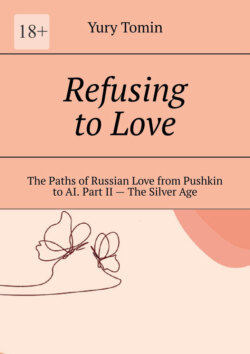Refusing to Love. The Paths of Russian Love from Pushkin to AI. Part II – The Silver Age

Реклама. ООО «ЛитРес», ИНН: 7719571260.
Оглавление
Yury Tomin. Refusing to Love. The Paths of Russian Love from Pushkin to AI. Part II – The Silver Age
Preface
I
Excitement time. New energies. A secluded place of passion. Fantastic attitude. common sickness. Passion in the language of music. Information flows of feelings. Storm in «The Tempest». Yet what kind of love? Love in words and music
II
Light shadows of love. The incarnation of a Beautiful Lady. The disappointment of non-platonic love. By the moonlit walls. Tall woman in black. The path of masculinity. The fruits of internal chaos. The echo of a forgotten hymn. Traces of human hooves. Never to give account to anyone
III
Rendezvous in a remote restaurant. Damn confused. The attraction of the amethyst ring. Deadly compromises of high love. A tribute to sensuality. Self-poisoning with love. Guardian of the threshold to the supersensual world. Work on the temples of the body. Temptations of bright chivalry. Victory over mania. Berlin’s pubs madness
IV
The drama of becoming a self-aware soul. Destroyers of the germs of desires. Face in a handkerchief. Sex as the center of the soul. Mysteries of human nature. Moral torment of the individual. The spirituality of sexual intercourse. Give me a loving family! Internal writings. The true way of clinging. Costs of an ideational marriage. Friendship and nobility turn into love. Philosophy of understanding and philosophy of life
V
An alluring light of soul and body. Secrets of a young woman. About the sexual issue. Women’s mind. Cheating on romantic vibes. But that’s not all. semi-accidental love. Against myself. Three years of valentine. Soul separation experiments. Search for divine sparks. Arithmetic of love. Triple bond. The ideal wife of a genius. Pure nudity. Two extreme routes
VI
Karma of Eros. Victim of the treasures of love. A terrible hour at the crossroads. A new lot for the demon of love. Reluctance to trust heaven. Extreme poles of love. Distributed love. A sad experience of unnecessary passions. Confession about a quiet haven. The stingy knight of love
VII
Overcoming Nietzsche. Dionysian thunderstorm. Ways of deification of man. Fundamentals of psychic life. Golden mask of love. Natasha Rostova at a debate about Eros. The power of the inevitable smile. The riddle of the lion’s heart. Community of mystical election. The kingdom of shadows. Transferring passion to the other world. Cancan of Moscow taverns. Completing the circle of symbolism
VIII
Conspirators against the void. Worshiper of honor. The poison of unrequited love. The haughty grin of romanticism. A wet slap. And I was his wife. Double challenge. Patterned belts. Don Juan in St. Petersburg. Stubborn architect. Myriad charges of love
Afterword
BIBLIOGRAPHY
Отрывок из книги
In the first part of the book about the paths of Russian love, we became acquainted with its Golden Age, which to a certain extent consecutively chronologically presents three stages of love culture reflected in the fates of outstanding writers and their works: romantic, rational, and innermost. And in each of these configurations of love relationships there is a desire to overcome the internal conflict associated with a certain gap between the ideal image of the participants in the love couple and their real embodiment. In a flurry of romantic feelings, a lover recklessly and passionately strives for an ideal, which is more associated with his own heroic ideal self than with the charms or spiritual qualities of the beloved. For a person who highly values both his own freedom and the dignity of his partner, in love, while honoring sublime romantic aspirations and life-giving energies, it is important to follow and conform to a certain set of reasonable principles that are supposed to be able to rationally harmonize the relationship. When immersed in the recesses of the human soul, it is discovered that the insidious enemy of love, its evil spirit, is the person himself striving for true love, or rather his dark shadow hypostasis.
The understanding that the paradoxes of love, discovered at different stages of the Golden Age of Love, could be eliminated only in some radical way, associated with overcoming the gravity of bodily human nature and breaking the insidious inertia of natural erotic drives, was latently or explicitly expressed by many seekers of true love. Reflecting on the inscrutable ways of love and the origins of love torment F.M. Dostoevsky, in the words of Dmitry Karamazov, called for the narrowing of the human soul:
.....
In the first part of the overture, Stasov proposes the theme of Miranda’s transition from «the state of childhood innocence to the state of a girl in love,» and in the second part, «she and Fernando would already be flying in full sails of passion, engulfed in the «fire of love.»
– Is a storm necessary in The Tempest? – Tchaikovsky clarifies from Stasov, not expecting any difficulties with the musical expression of the state of first love, turning into a love fire.
.....